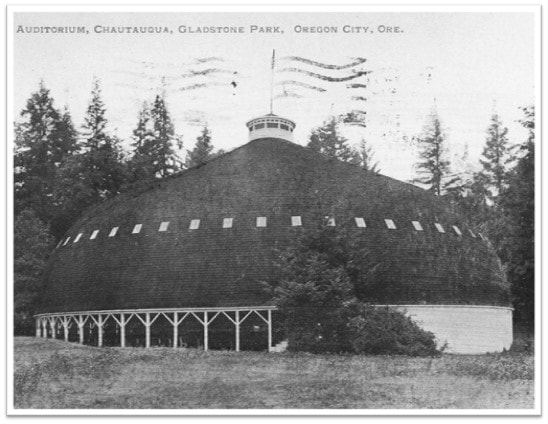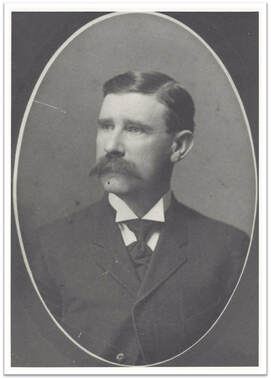History of Gladstone Oregon - page 2
|
In 1882, (Clackamas County Judge) Harvey Cross, a successful Oregon City lawyer and one-time state senator, purchased the Cason house for his family. Soon after, he began buying up portions of the Cason's original 640-acre donation land claim with a view towards establishing a town, which he planned to name after his hero, William Ewart Gladstone, four-time Prime Minister of England.
In 1889, Judge Cross formed the Gladstone Real Estate Corporation and in 1894, platted East Gladstone; an area that extended eastward from Portland Ave. and included the 73-acre undeveloped woodland tract with lake that he called Gladstone Park. Upon the suggestion of surveyor, Sidney Smyth, Judge Harvey Cross decided to name the streets running in direction from the east to the west for American colleges or universities; and the avenues running in direction from the north to the south for English dukes and earls The exception to the north-south rule was Portland Avenue, Gladstone's main street. This thoroughfare was named for the Interurban Electric Streetcar (1893) line that ran from Oregon City to Portland through the heart of Gladstone. (Streetcars also ran on a spur line along Dartmouth Street to the entrance of Gladstone Park, location of the Chautauqua.) On January 10, 1911, Judge Cross incorporated his city. Oscar E. Freytag was elected the first mayor. 1899 postcard showing the first Chautauqua Auditorium in Gladstone Park. Built in 1895 and known affectionately as the "Beehive", the domed building accommodated 3000 people under its roof and an equal number around the outside. In 1917, this auditorium was replaced by a second larger beehive.
|
Judge Harvey Cross - Founder of Gladstone
1856 -1929 In 1894, Eva Emory Dye, an Oregon City author and proponent of Chautauqua, persuaded Judge Cross that such an event would be of great benefit to Gladstone and the other surrounding communities. Judge Cross granted a fifty-year lease of his Gladstone Park to the newly formed Willamette Valley Chautauqua Association for the annual summer assembly, which offered lectures, concerts and theatrical performances. Gladstone hosted its first outdoor Chautauqua July 24-26, 1894. It rained
The next year (1895), a covered auditorium was erected that seated 3000. Described as a "beautiful and pleasant place" with a "very silent and still" lake, Gladstone Park soon became a popular cultural and social center. Season tickets for the ten, all-day sessions cost $2.00. With Railroad and trolley lines able to bring people from other towns and communities, appearances by such notables became common. These included the evangelist, Billy Sunday; band master, John Phillip Sousa; poet, Joaquin Miller, presidential candidate Theodore Roosevelt and the most popular speaker of all, William Jennings Bryan. In 1907, the first official Clackamas County Fair was held on the Chautauqua Grounds - Gladstone Park. |

